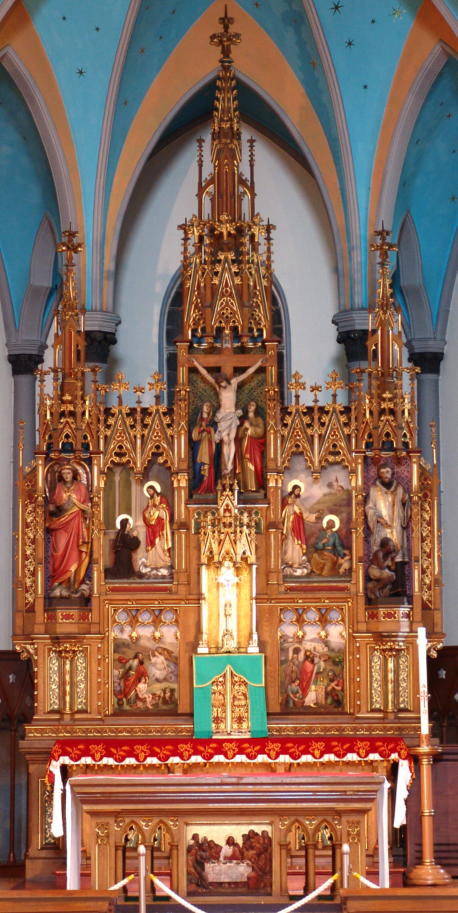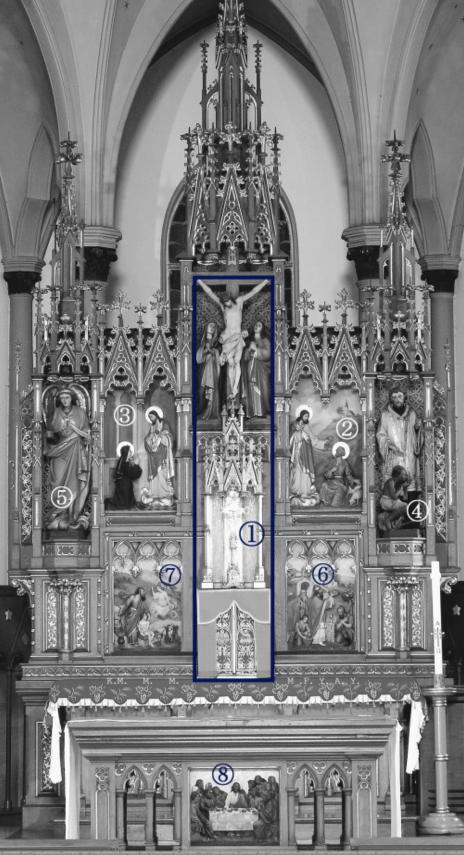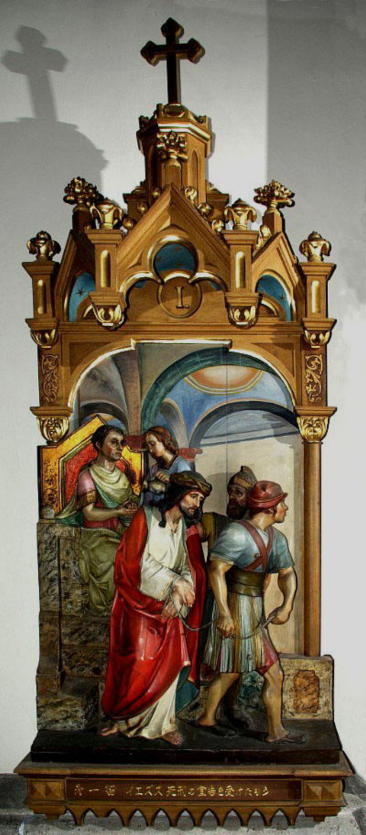Catholic Motomachi Church has an old history along withYamanote Church in Yokohama and Ohura Church inNagasaki.
In 1859, a temporary church was built by the priest MermetCachon of the Paris Foreign Missions Church and dedicatedto the Immaculate Conception of the Virgin Mary.
(The oldest in Japan)
The present church was constructed in 1910 after theHakodate Great Fire of 1907. Gothic architecturecharacterizes its magnificent interior, which is quite rareamong cathedrals in Japan.
All the statues including the central altar were made of woodin the Tirol district of Italy (now part of Austria) and werepresented to this church by Pope Benedict XV.
This workshop's works were sought after all over the worldand were designated cultural assets in many countries.
(Based on a 2023 on-site survey by Dr. Riichi Miyake)
Front Altar


@In the central part of the altar, there is a tabernacle, above which youcan see Jesus Christ on the cross who gave his life in sacrifice.Depictions of Mother Mary and His disciple John gaze at Him from thesides of the crucifix. gFor this reason am I loved by the Father, because Igive up my life so that I may take it again.h (John, Chapter 10:17)
A The statue on the right side of the crucifix is St. Peter, to whom Jesusgave the keys to the kingdom of heaven and made him the head of church.Then when they had taken food, Jesus said to Simon Peter, gSimon, sonof John, is your love for me greater than the love of these others?h Hesaid to him, gYes, Lord; you are certain of my love for you.h He said tohim, gThen, give my lambs food.h (John, Chapter 21:15)
B The statue at the lower left of the cross shows Jesus expressing hislove to a woman named St. Marguerite Marie Alacoque. After receivingrevelation, she popularized the "Devotion to the Sacred Heart of Jesus"movement among nuns, and was canonized by Pope Benedict XV on May13, 1920. The same Pope Benedict XV ordered this altar for MotomachiChurch two years later in 1922. It is unclear whether the Pope instructedthe altar or the workshop simply thought it out, but it is certain that thecanonization is related to this. (Her feast day is October 16.)
C The big statue on the right side is St. Francisco Xavier, who, in the early 16th century, was the first to introduce Christianity to Japan. Sincehis missionary activities were mainly in India, this picture depicts thescene of the baptism of an Indian boy. gAnd he said unto them, Go yeinto all the world, and preach the gospel to every creature. He thatbelieveth and is baptized shall be saved; but he that believeth not shall bedamned. And they went forth, and preached everywhere, the Lord workingwith them, and confirming the word with signs following. Amen. h (Mark, Chapter 16: 15,16,20)
D The big statue on the left side is St. Michael, whose name means gWho is like God?h It is said that since the day of St. Francisco Xavierf sarrival in Japan was the celebration day of St. Michel, this saint became aguardian angel of Japan.
E Two pictures at the lower part of the altar depict the scenes ofAbrahamfs life who believed in the one and only God. In the right picture, Melchizedek, who was the priest of the Most High God, is shown bestowinga@blessing on Abraham. The bread and wine he offered at that timebecame a symbol of the offering of Jesus@Christ.
F The picture on the left side portrays the scene of Abraham about to offer the life of his only child to God. (Genesis, Chapter 22)
This event is similar to God the Fatherfs love as shown when He gave His only begotten Son to the world. (The First Epistle of John 4:9 )
G The relief on the table in front of the altar is the Last Supper with Jesus Christ and his twelve disciples. And he took bread and, having given praise, he gave it to them when it had been broken, saying, gThis ismy body, which is given for you: do this in memory of me.h Likewise alsothe cup after supper, saying, gThis is the new testament in my blood,which is shed for you" (Luke, Chapter 22:19,20)
This altar is the central feature of the mass, which is conducted for thepurpose of observing Jesus Christfs words and commemorating his death.Priests bestow a blessing on the bread and wine and as a pabulum(nourishment of both body and spirit). They have them together withbelievers in Jesus Christ.
In addition to the central altar, you can see two smaller altars on bothsides of this cathedral. On the left, you can see the statue of the gSacredHeart of Jesush, which symbolizes Christfs love. On the right, you can seethe statue of Mother Mary to whom this church was dedicated.
@The Stations of the Cross on the wall

@These statues are called “The Stations of the Cross”,describing a series of events starting from the scene of Jesusfs@beingsentenced to death, up to his to rest. Some events are based on the Bible;others are taken from old legends of the@church. The first station beginsat the right side of the central altar and the last (14th) station ends at theleft side.
Each@statue shows the expressive face of Jesus Christ which appeals tous and moves the believers to pray.
HOME